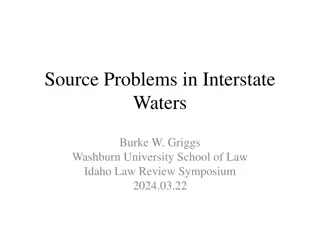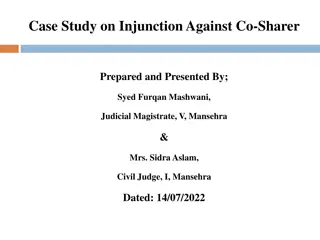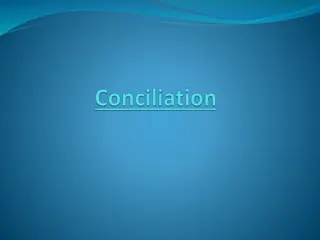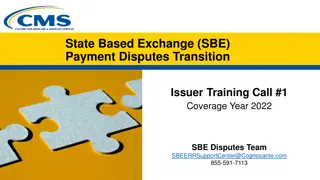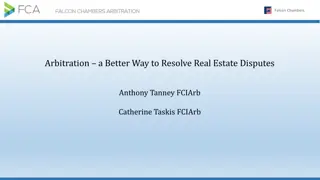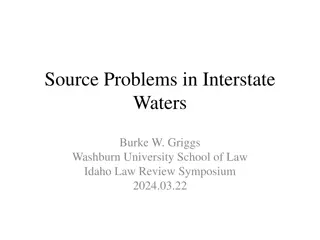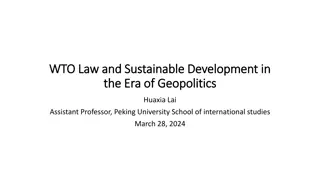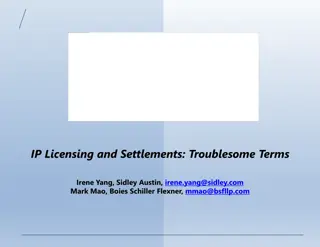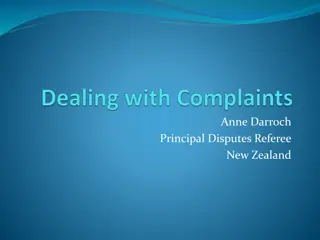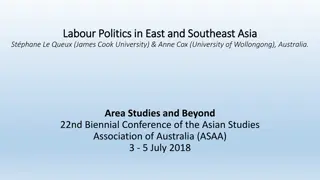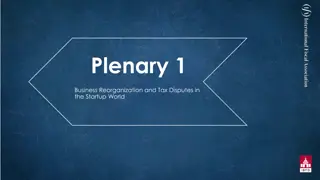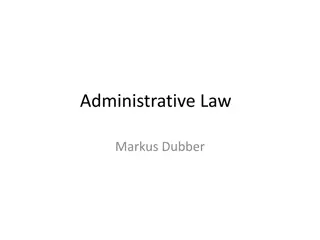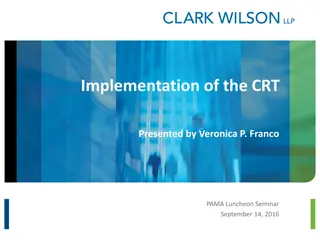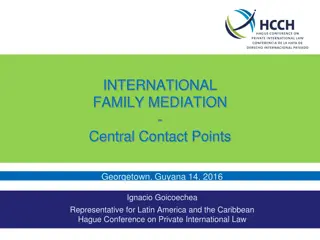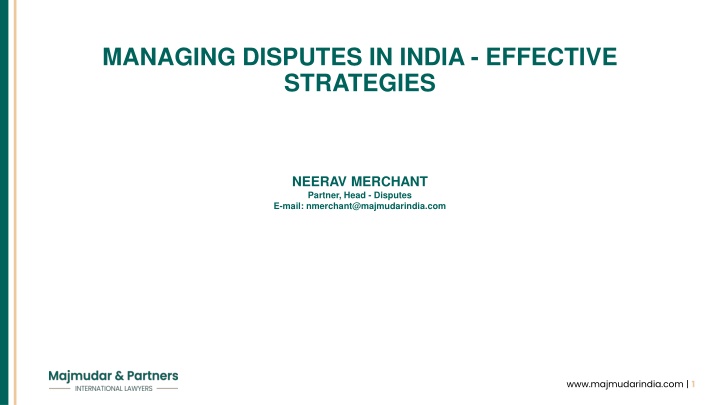
Effective Dispute Management Strategies in India by Neerav Merchant
Learn about effective dispute management strategies in India outlined by Neerav Merchant, covering topics such as the hierarchy of courts, overview of writs, the Commercial Courts Act, arbitration laws, and more. Gain insights into managing disputes effectively in the Indian legal system.
Download Presentation

Please find below an Image/Link to download the presentation.
The content on the website is provided AS IS for your information and personal use only. It may not be sold, licensed, or shared on other websites without obtaining consent from the author. If you encounter any issues during the download, it is possible that the publisher has removed the file from their server.
You are allowed to download the files provided on this website for personal or commercial use, subject to the condition that they are used lawfully. All files are the property of their respective owners.
The content on the website is provided AS IS for your information and personal use only. It may not be sold, licensed, or shared on other websites without obtaining consent from the author.
E N D
Presentation Transcript
MANAGING DISPUTES IN INDIA - EFFECTIVE STRATEGIES NEERAV MERCHANT Partner, Head - Disputes E-mail: nmerchant@majmudarindia.com www.majmudarindia.com | 1
SESSION TOPICS Hierarchy of Courts in India Overview of Writs in India Overview of the Commercial Courts Act, 2015 (the Commercial Courts Act ) Enforcement of Foreign Judgements in India Overview of the Arbitration and Conciliation Act, 1996 (the Arbitration Act ) Effective Strategies for Arbitration Effect of Non-Strategized Arbitration Agreement Interim Relief Foreign Awards Our Firm Experiences and Strategies www.majmudarindia.com | 2
HIERARCHY OF COURTS IN INDIA Supreme Court High Court Subordinate Courts Civil Courts Criminal Courts Session Courts District Courts (District Judge) City Civil Courts (Metropolitan Courts) Metropolitan/ Judicial Magistrates (Class I) Sub Courts Small Cause Courts (Senior/Principal/Junior Civil Judge) Judicial Magistrates (Class II) Munsif Courts Executive Magistrates www.majmudarindia.com | 3
OVERVIEW OF WRITS IN INDIA Constitutional Remedies Supreme Court and High Courts are empowered to issue Writs for the enforcement of fundamental rights guaranteed under Article 19 of the Indian Constitution. The Supreme Court can be approached under the Writ jurisdiction enshrined in Article 32 of the Indian Constitution. High Courts can be approached under the Writ jurisdiction enshrined in Article 226 of the Indian Constitution. Writ Jurisdiction Of High Court Public law remedy of immense scope. Territorial extent of writ jurisdiction. Discretionary remedy. Supervisory power. Writ jurisdiction gets restricted when an alternate remedy is available. www.majmudarindia.com | 4
OVERVIEW OF THE COMMERCIAL COURTS ACT Objectives To reduce the pendency of the Commercial Disputes which earlier were dealt with under the category of regular suit. It has enabled both domestic and foreign investors to gain trust in the Indian markets and judiciary. Types Of Commercial Disputes Breach of contractual relationship. Unfair trade practice or deficiency of service. Intellectual property rights infringement. Jurisdiction Of Commercial Courts: All petitions of commercial disputes arising in the territory of a State over which it has been conferred territorial jurisdiction are resolved by the commercial courts of such State. Division Of Commercial Courts: Commercial Divisions of High Courts with original jurisdiction (Minimum threshold value is notified by State Government). Commercial Courts at the District level (Minimum value of INR300,000 (US$3,700) and up to value notified by the State Government). www.majmudarindia.com | 5
ENFORCEMENT OF FOREIGN JUDGEMENTS IN INDIA Jurisdiction Of Foreign Courts Person is the subject of the foreign country or is residing in the foreign country when the action commenced; Person selects the foreign court as the forum; or Defendant in the character of plaintiff has selected the forum in which he is later sued. Presumption (Section 14 Of The Civil Procedure Code, 1908 ( CPC )): Court shall presume, upon receipt of a certified copy of a foreign judgment, that such judgment was pronounced by a Court of competent jurisdiction unless the contrary appears on the record, or such presumption is displaced by proving want of jurisdiction. Exceptions To Conclusive Nature Of Foreign Judgments (Section 13 Of The CPC) Court does not have jurisdiction; Judgement not given on the merits of the case, is opposed to natural justice or is obtained by fraud; Incorrect or unrecognized international law; or Claim founded on a breach of any law in India Argument on public policy of India. www.majmudarindia.com | 6
ENFORCEMENT OF FOREIGN JUDGEMENTS IN INDIA (CONTD.) Enforcement Process (Section 44-A Of The CPC) Decree must be of a superior court of a reciprocating territory. Decree should be final or non-appealable Certified copy of a decree is to be filed in a District Court or a High Court. Decree maybe executed in India as if it had been passed by the District Court. Decree should be a money decree, i.e., any decree under which a sum of money is payable. Certificate as to what extent the decree has been already satisfied (if any) should be given by the foreign court. www.majmudarindia.com | 7
OVERVIEW OF THE ARBITRATION ACT Purpose To consolidate and amend the law relating to Domestic Arbitration and International Commercial Arbitration. Enforcement of Foreign Arbitral Awards. Key Features Parties can decide the substantive law and rules for the arbitration proceedings. Arbitral proceedings retains confidentiality of the dispute. Facilitates quick resolution of the commercial disputes. Court (in India) can provide certain interim measures of protection. Award of an arbitrator is enforced as a decree of a Court India is a signatory to the New York Convention. Judicial review is available for challenging the award. www.majmudarindia.com | 8
OVERVIEW OF THE ARBITRATION ACT (CONTD.) Kinds of arbitration in India Ad-Hoc Arbitration; Institutional Arbitration; Domestic Arbitration (Part I of the Arbitration Act deals with Domestic Arbitration); and Foreign Arbitration (Part II of The Arbitration Act deals with enforcement of New York Convention awards and Geneva Convention awards). Arbitration Agreement It may be in the form of an arbitration clause in a contract, or in the form of a separate agreement. It must be in writing in documents signed by parties. Exchange of letters, telex, telegrams or other means of telecommunication which provide a record of the agreement. www.majmudarindia.com | 9
OVERVIEW OF THE ARBITRATION ACT (CONTD.) Key Provisions And Amendments of 2015 in the Arbitration Act Amendment to the definition of the term Court . Section 2(2): Part-I of the Arbitration Act shall apply where the place of arbitration is in India. Section 8 (Referring parties to arbitration): Judicial authority shall refer the parties to the arbitration unless it finds that prima facie no valid arbitration agreement exists. Section 9 (Interim Measures): Arbitral proceedings must be commenced in ninety (90) days if the Court grants interim relief before commencement of arbitration proceedings. Section 11: Appointment of Arbitrators. Section 17 (Interim measures by Arbitral Tribunal): Arbitral Tribunals shall have the same powers under Section 17 as are available to a court under Section 9. Section 29A and 29B: Time limit for arbitral award and fast-track procedure. Section 34 (Scope of Public Policy): Contravention of the fundamental policy of Indian law or conflict with the notions of morality or justice added. www.majmudarindia.com | 10
EFFECTIVE STRATEGIES FOR ARBITRATION Key Contents Of A Well-Drafted Arbitration Clause Scope of the arbitration agreement; Seat and venue of the arbitration; Governing law of the arbitration agreement; Choice of rules; Number and qualifications of arbitrators; Time limit for passing an award; Manner of incurring and splitting arbitration costs; and Confidentiality and survival. www.majmudarindia.com | 11
EFFECTIVE STRATEGIES FOR ARBITRATION (CONTD.) Other Key Points Provide for phased / tiered dispute resolution mechanisms; Prepare and enforce budgets; Select the Right arbitrator; and Limit the time and scope for discovery of information. www.majmudarindia.com | 12
EFFECT OF NON-STRATEGISED ARBITRATION AGREEMENT Indian Oil Corpn. Ltd. V. Raja Transport ((2009) 8 SCC 520) Arbitration agreement must be entered after clear comprehension of its provisions and clauses. Once an arbitrator is decided, the parties cannot contend the validity of the arbitrator on certain grounds at a later stage. Imax Corpn. V. E-city Entertainment (India) (P) Ltd. ((2017) 5 SCC 331) Court held that where the parties have expressly agreed and chosen the seat and applicable law outside of India, there arises no question of allowing a challenge to the decision in India www.majmudarindia.com | 13
INTERIM RELIEF Conditions For Grant Of Interim Relief Prima facie evidence of cause and the balance of convenience lies with the aggrieved party; and Irreparable damage or injury may be caused if the interim relief is not granted. Key Features of Section 9 Of The Arbitration Act: To be filed before, during arbitration proceeding or at any time before the commencement of arbitration proceedings. Interim relief not permitted after the tribunal has been constituted unless the aggrieved party proves beyond doubt. Permissible Interim Reliefs Under Section 9 Preservation, interim custody or sale of goods for any goods related to the arbitration agreement; Securing the amount of claims; Allowing the detention, preservation or inspection of any property or thing; Allowing interim injunction or appointment of receiver; and Any other reliefs which the court considers proper by considering the facts and circumstances of the case. www.majmudarindia.com | 14
INTERIM RELIEF (CONTD.) Jurisdiction And Enforcement Of Interim Reliefs (Domestic Arbitration) The court of the seat of arbitration has exclusive jurisdiction. Section 17 of the Arbitration Act gives the arbitral tribunal the powers to grant interim reliefs. Application to be made in the relevant District Court or High Court. Jurisdiction And Enforcement Of Interim Reliefs (International Commercial Arbitration) When at least one of the parties is non-Indian, then Section 9 application may be made only in the High Court. Award for interim relief must be filed under Section 9 as it cannot be enforced directly. The agreement should not in any express or implied way exclude the applicability of Section 9 of the Act Grounds for Temporary Injunction (Order 39 Rule 1 of the Civil Procedure Code, 1908) Property in dispute; Defendant threatens or intends to remove or dispose of his property with a view to defraud creditors; www.majmudarindia.com | 15
INTERIM RELIEF (CONTD.) Defendant threatens to dispossess the plaintiff or otherwise cause injury to the plaintiff in relation to the property in dispute; Defendant is about to commit breach of contract; or Court is of opinion that interest of justice necessitate a temporary injunction. Conditions For Granting Temporary Injunction Prima facie evidence of cause in favor of the plaintiff. Irreparable injury is likely to be caused to the plaintiff. Balance of convenience is in favor of the plaintiff and against the defendant. There is a bona fide dispute raised by the applicant Adhunik Steels Ltd. V. Orissa Manganese And Minerals Pvt. Ltd. ((2007) 7 SCC 125: While deciding an application under Section 9 of the Arbitration Act, the Supreme Court held that Courts must keep in mind the principles of the Civil Procedure Code, 1908. www.majmudarindia.com | 16
FOREIGN AWARDS Definition: Section 44 of the Arbitration Act defines a Foreign Award . Enforcement Process Documents Required (Section 49) Original award or the copy; Original arbitration agreement or a copy; Evidence to prove the award that is rendered is foreign in nature; and Translation of award in English if it is in the local language of the foreign country. Conditions For Enforcement (Section 58) Award has been made in pursuance of the submission to the arbitration; Subject-matter of the award is capable of settlement; www.majmudarindia.com | 17
FOREIGN AWARDS (CONTD.) Award is made in the manner agreed by the parties; Award has become final in the country it is made; Enforcement of the award is not contrary to the public policy of India; and Other party has received sufficient notice time before the award is passed. Unenforceability of Award (Section 48) Arbitration agreement is not valid under law; Parties were under some legal incapacity or party was not given proper notice; Award contains decision on matters beyond the scope of submission to arbitration or is not in accordance with the agreement between parties; Subject matter of the dispute is not capable of being arbitrated; or Enforcement of the foreign award is against the public policy of India. www.majmudarindia.com | 18
FOREIGN AWARDS (CONTD.) Key Judicial Rulings Bhatia International V. Bulk Trading (AIR 2002 SC 1432): Supreme Court held that an arbitration award that is not made in a convention country shall not be considered a foreign arbitral award. It can be enforced only by filing another suit. Balco V. Kaiser ((2012) 9 SCC 649): Supreme Court held that only Part II of the Arbitration Act is applicable to foreign awards and these awards cannot be set aside under the Indian law. Foreign awards can be set aside or challenged only in jurisdiction where seat of arbitration is situated. Government Of India V. Vedanta Ltd. (CA No. 3185 Of 2020): Time-limit for enforcement of foreign award under the Arbitration Act will be 3 years from when the right to apply accrues. Subject to the ambit of Article 137 of Limitation Act, 1963. Amazon.Com NV Investment Holdings V. Future Retail Ltd. (CA No. 4492-93 Of 2021): Supreme Court held that emergency arbitration awards are recognized under Section 17 of the Arbitration Act. www.majmudarindia.com | 19
FIRM EXPERIENCES AND STRATEGIES US Manufacturing Company Case Related to non-entertainment of foreign awards and judgements. Issue was defect in title and arbitration filed for fraudulent misrepresentation in Singapore. The Indian promoters (Respondents) approached the District Court (in India) seeking an injunction against the foreign arbitration. Our Strategy Emergency Arbitration Proceeding filed under SIAC Rules for an injunction. Issue was on the enforceability of the injunction. Obtained a final judgement from a Singapore Court which was enforced in India. Ericsson Group Subsidiary Case Plaintiff (Our client) was a mobile portability service provider that facilitated the servicing of mobile portability in India. Defendant was one of India s largest telecommunication players. www.majmudarindia.com | 20
FIRM EXPERIENCES AND STRATEGIES (CONTD.) As per the Telecom Regulatory Authority of India, every porting request from an individual user for porting of a mobile number from 1 telecommunication service provider to another required the latter to pay INR19 to the mobile potability service provider. Around 2016-2017, several users ported their numbers to the defendant's company, which led to the defendants having to pay a huge sum to the plaintiff. Defendant lobbied for the servicing amount to be reduced to INR4. Plaintiff suffered immense loss. Our Strategy Filed a writ petition in the Delhi Hight Court under Article 19(1)(g) of the Indian Constitution. Filed for interim relief in the Supreme Court and obtained the same within 10 months. Recovered the entire loss suffered by the plaintiff from the defendant. www.majmudarindia.com | 21
THANK YOU www.majmudarindia.com | 22

